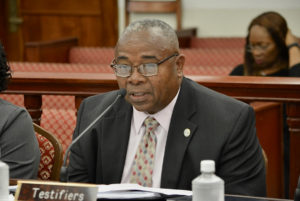
The Public Services Commission on Tuesday told senators that, while it is possible the Levelized Energy Adjustment Clause, or LEAC, could go down in six months, Virgin Islands Water and Power Authority consumers could still end up paying more in their monthly electric bills.
The PSC and the Department of Justice presented their budgets to the Senate Finance Committee Tuesday.
“The commission works in making sure that the LEAC is not arbitrary and capricious; it has to be based on the numbers,” said PSC Director Donald Cole, who presented the commission’s FY 2019 budget to the Senate Finance Committee on Tuesday.
“With the new units coming on board, we’re basically going to see a reduction in the LEAC,” said Cole, who maintained he remains cautious about the potential LEAC decrease.
Cole reminded lawmakers, however, that the LEAC represents only part of residents’ power bill. The base rate, which takes care of the rest of the utility’s operational costs, could still go up because of infrastructure expenses incurred when WAPA entered into a contract with VITOL Corporation for its propane conversion project.
“VITOL put this contract forward and they built all that infrastructure and they’re now charging the utility for it,” Cole explained. “VITOL now is asking us to pay $100 million amortized over a 10-year period, and when you amortize that, you’re talking almost $1.5 billion dollars.”
The PSC recently approved a new LEAC at it its June 29 meeting, raising the per-kilowatt fuel surcharge fee from 14.35 cents to 18.28 cents. According to Cole, based on an average household usage of 400 kilowatt hours a month, this translates to roughly $11 in additional fees monthly for ratepayers. According to WAPA, this could bring an additional $1.5 million a month into WAPA’s coffers.
Smaller households, however, will be spared the increased fee, according to Cole. Ratepayers who use less than 250 kilowatt hours a month will not be subject to the LEAC increase.
The PSC finds itself doing a balancing act, said Cole, taking into account the ratepayers and the utility, which the PSC cannot allow to go bankrupt. Sen. Tregenza Roach said lawmakers understand it’s a fine balance but the utility does have a multimillion-dollar propane conversion project that is currently implemented only on St. Croix.
“At the expense of ratepayers waiting for the propane conversion to benefit them with lower cost per kilowatt hour, and now they still have to pay the increased cost of fuel while they wait for this multimillion-dollar propane conversion to take effect,” said Roach.
Cole acknowledged the burden electric costs have been to the Virgin Islands residents, calling it “the single biggest hurdle to economic development.”
“Costs have been as high as $360 million per year for a population of 110,000 people; that is a per person cost of $3,272 and by far the highest in the United States,” said Cole.
Cole also reported on the status of telecommunications in the territory which went through “an incredible challenging year,” he said.
“One of the key lessons going forward should be the realization that while residents and businesses can survive for extended periods of time without electrical services, without
telecommunications all business and most social life is stopped,” said Cole.
After the 2017 hurricanes, he said, telecommunications, including internet access, were restored months before electrical services and long before landlines.
The Federal Communication Commission also advanced Universal Service Fund money to help VIYA in the restoration of service throughout the territory.
Cole also called on the Legislature to update the definition of “telephone service” under the law, which has remained the same for 50 years in spite of technological advances.
“When the code was written, cell phones and the internet did not exist,” he said, adding that the memorandum forward by the commission to the Senate requesting modernization of the language “has languished in the legislature for more than 10 years with no action.”
This year, the PSC is asking the Legislature to approve a budget of $1.78 million, even though it does not receive funding from the general fund. Instead, the commission takes into account its maximum allowable appropriation of $1.8 million and generates the amount by taking a percentage out of the audited financial statements of the utilities it regulates. According to Cole, they cannot raise their $1.8-million budget ceiling outside of new legislation.
Department of Justice
Deputy Chief Attorney General Joseph Ponteen presented the Department of Justice’s Budget on Tuesday in the absence of Attorney General Claude Walker, who was called to a mandatory cabinet meeting.
The DOJ, consisting of eight divisions spread over the two districts, is responsible for providing legal representation to the government, from civil and criminal mailers to appeals and child support issues. The Department has 133 employees, but suffers from some 21 vacancies after employees separated from the agency in the aftermath of the hurricanes.
The staffing shortage is stretching the department to its limit, according to Ponteen. The Civil Division, for example, has five attorneys handling some 200 cases, with some 40 new cases since September 2017. Only 20 of these cases have been closed so far. The Criminal Division also needs three additional assistant attorneys general on St. Thomas and two additional prosecutors on St. Croix, according to Ponteen.
This year, the DOJ is asking for $22.5 million, with $15.2 million coming from the general fund and almost $6.5 million from non-appropriated federal funds. The budget request represents a $1.5 million increase from last year’s budget.





